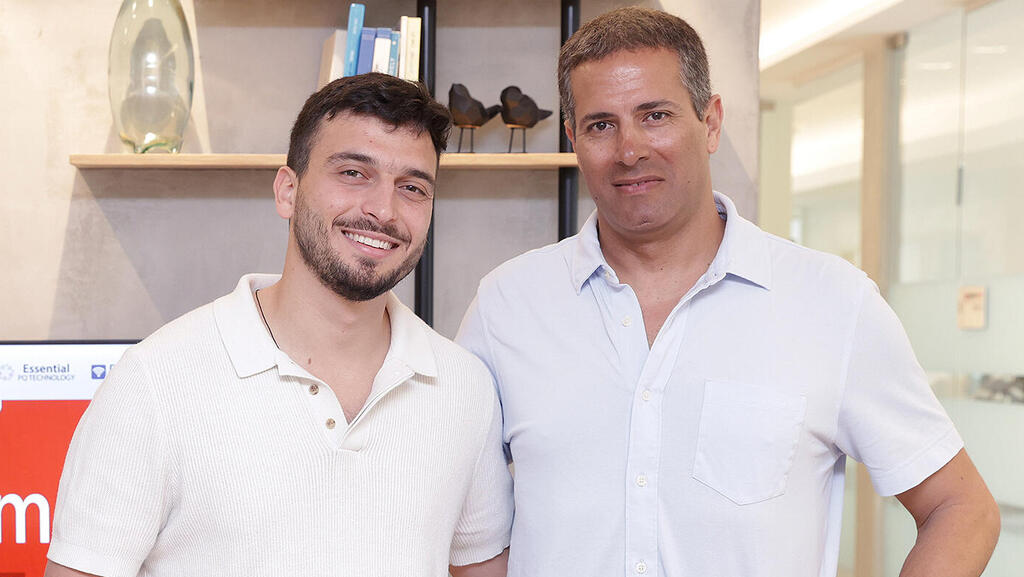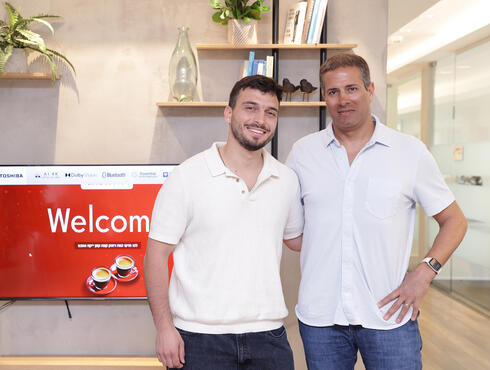
“Selling the product is the easy part. Convincing people to believe in you is the hard part”
When Amitai Ratzon, CEO of cybersecurity firm Pentera, sat down with Yoav Hadad, a reservist and the founder of IDEON Technologies, their conversation was more than a meeting of minds—it was a reflection of the unique pressures facing Israel’s early-stage entrepreneurs in wartime.
When Amitai Ratzon, CEO of cybersecurity firm Pentera, sat down with Yoav Hadad, a reservist and the founder of IDEON Technologies, their conversation was more than a meeting of minds—it was a reflection of the unique pressures facing Israel’s early-stage entrepreneurs in wartime. As part of Calcalist and Poalim Tech’s Growth+ initiative, the two explored how salesmanship, resilience, and a willingness to operate far outside one's comfort zone can define the difference between survival and scale in a high-stakes tech ecosystem.
The Growth+ project by Calcalist and Poalim Tech, now in its second year, is aimed at strengthening the resilience of Israel’s high-tech industry. The project features a series of 1:1 meetings between experienced entrepreneurs and early-stage startups, with the goal of advising, supporting, and providing knowledge about entrepreneurship, creativity, startup management, and building companies for growth.
Amitai, tell us about a crisis you experienced early on, and what early-stage entrepreneurs can learn from it.
"I graduated from IDC in 2005 and started working as a salesperson at a fintech company called SuperDerivatives. I was assigned a sales territory that was considered non-strategic—Scandinavia and Iceland—and the CEO told me it was because I had no background in fintech and it would be very difficult for me to succeed. This spurred me on. I was an underdog, and I knew that what I lacked in technical knowledge, I would make up for in ambition. Within a year, I became the company’s top salesperson.
"I learned that you have to deeply study your company’s domain and understand the level of expertise required to market and sell it internationally. I realized that, because I am not a technologist but come from the world of sales, everything I do in entrepreneurship and high-tech would be outside my comfort zone."
Is sales a critical skill for an entrepreneur?
"Absolutely. We have a great example at Pentera. My partner Arik Liberzon, CTO and co-founder, used to sell insurance policies in Arab villages while studying aeronautical engineering at the Technion. Every entrepreneur is first and foremost a salesperson—you sell to your co-founder on why they should join, to investors on why they should fund you, and to employees on why they should come on board despite the risks. Selling the product is the easy part. Convincing people to believe in you is the hard part."
Related articles:
Yoav, what was your biggest challenge this year?
"The most significant challenge for me was balancing military reserve duty with managing the business. I served almost 400 days in reserves starting from October 7th. I already had a team that needed me—and I needed them. Letting go and allowing the business to run without me was the scariest thing in the world. For weeks in Gaza, I bit my nails wondering if the team would meet deadlines, if orders would be fulfilled, or if things would fall apart. It was an incredibly tough experience."
Amitai, what advice did you give him?
"Many ventures arose out of the trauma of October 7th, especially in the defense-tech field. Some were able to raise money driven by Zionism and emotional identification. But the next round of funding will come from cynical investors who are only looking for a 10x or 100x return. You have to translate the Israeli problem into a global opportunity—something the world will understand and want to invest in."
What did you learn from each other during the meeting?
Amitai: "I am very impressed by Yoav’s positive audacity. This is someone who literally encountered terrorists face-to-face in Gaza, saw unimaginable things with his unit, and experienced deep helplessness. Instead of freezing, he channeled that helplessness into action—he raised money, built a system, and created a venture that can save lives. It’s admirable. We need more people who, instead of falling into despair, transform trauma into opportunity."
Yoav: "I felt like the conversation propelled me ten years forward. I gained perspective—that even experienced entrepreneurs make mistakes and that they too started where I am today. The biggest lesson I took is that right now, everything depends on me. If I stop believing in what I’m doing, then this venture dies."
Michal Kissos Hertzog, CEO of Poalim Tech, which initiated the Growth+ project, said:"In 2025, entrepreneurs once again find themselves facing a complex reality: on the one hand, rapid technological progress, especially in the field of artificial intelligence, and on the other, geopolitical and economic challenges. The security situation in Israel continues to affect the local economy, and uncertainty increases the pressure on entrepreneurs, who must navigate their businesses through constantly changing conditions. The challenge is not just to survive, but to grow and innovate. In the midst of all this, it’s crucial to remember the value of personal balance. The ability to take breaks, spend time with family and friends, and maintain mental and physical health is not a luxury—it is a condition for long-term success. Entrepreneurs who manage to combine intensive work with a balanced life are the ones who can lead their companies forward, even in difficult times."
Through the Growth+ project, Calcalist and Poalim Tech continue to connect entrepreneurs with experienced mentors, providing tools and support for the challenging journey of building successful companies in today’s environment.
